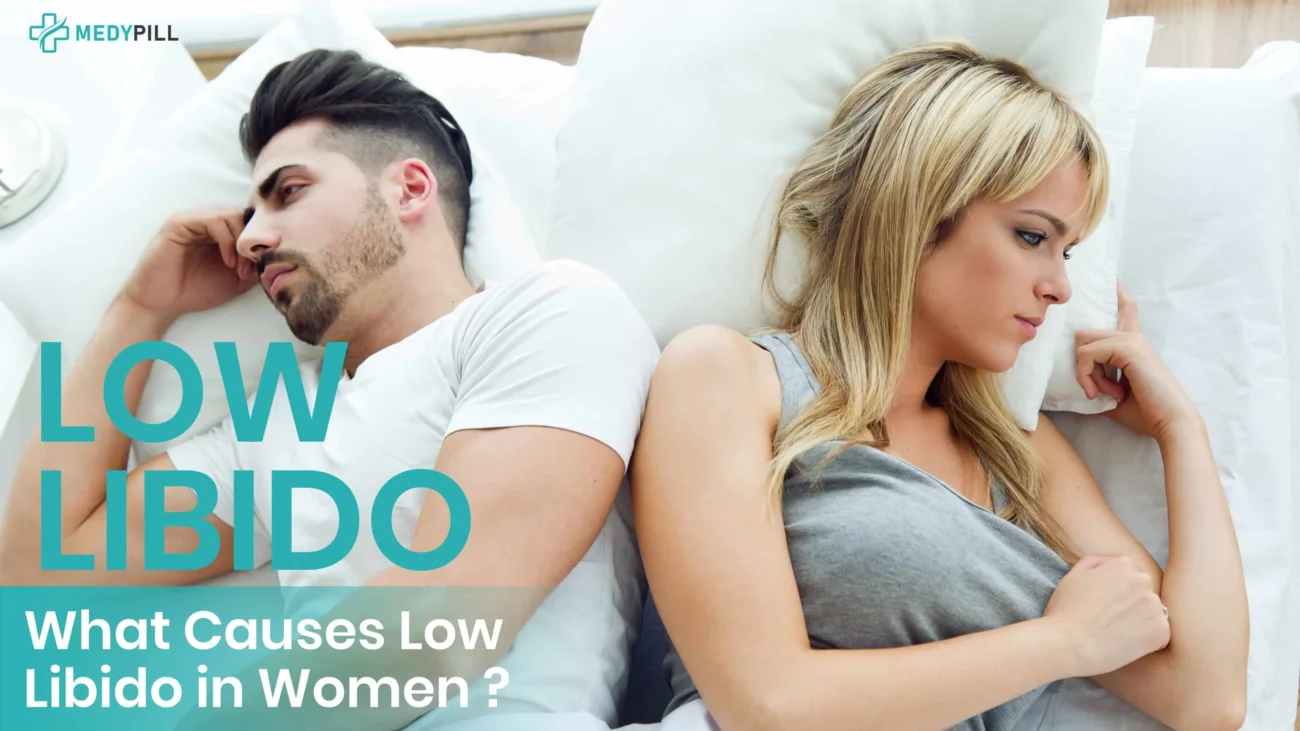
What Causes Low Libido in Women?
The causes of low libido in women are multifactorial and can include hormonal imbalances, mental health issues, poor lifestyle habits, unsatisfying relationships, and chronic medical conditions.
Low libido, or reduced sexual desire, affects around 33% of women at some point in their lives, with over 50% of Menopausal women reporting it.
This means more than one in three women may experience a lack of interest in sex, often leading to confusion, frustration, or distress.
Understanding these root causes is crucial for finding effective and personalized solutions.
What Affects Women’s Libido? A Multifactorial Issue
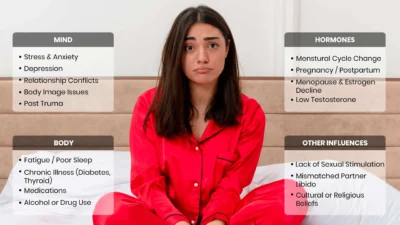
Women’s libido is influenced by a combination of internal and external factors, such as hormonal imbalances, menopause, psychological stress, lifestyle habits, relationship satisfaction, and medical conditions.
From hormonal shifts to psychological and relationship challenges, it’s rarely caused by a single issue.
Key contributors include:
- Hormonal fluctuations (e.g., menstrual cycle, pregnancy, menopause)
- Psychological health (stress, anxiety, trauma)
- Lifestyle choices (diet, sleep, alcohol use)
- Medical conditions (PCOS, thyroid issues, depression)
- Relationship satisfaction (communication, intimacy, emotional connection)
A large U.S. study found low sexual desire in 27% of premenopausal women and over 50% in menopausal women, though only 10% felt personal distress.
Related for men: A Complete Guide to ED Medications Online Available
Hormonal Imbalance: What Hormone Causes Low Libido in Women?
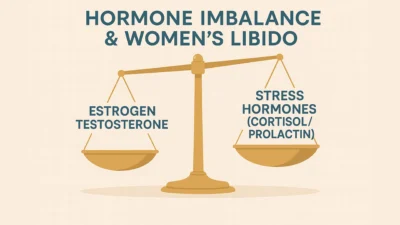
Low levels of estrogen, progesterone, and testosterone are the most common hormonal culprits behind reduced libido in women.
Testosterone, often called the “desire hormone,” drives arousal and sexual motivation. Levels naturally decline from the mid-30s and drop by about 50% by menopause.
Low levels are strongly associated with reduced libido, especially after menopause or ovary removal.
Estrogen also plays a vital role, and sharp drops during menopause or after childbirth can lead to vaginal dryness and decreased sensitivity, making sex less enjoyable.
Progesterone declines with age and after childbirth, which may also impact sexual desire.
Some hormonal birth control methods can also suppress libido by altering hormone levels.
Psychological Triggers: Stress, Anxiety & Body Changes
Psychological issues can affect libido just as much, or more, than physical causes.
- Stress & anxiety: High cortisol from ongoing stress (work, caregiving, finances) directly suppresses sexual desire.
- Depression: A major libido killer, depression impacts energy, mood, and self-worth. Some antidepressants (especially SSRIs) further reduce sex drive.
- Body image issues: Weight changes, aging, or postpartum changes can lead to low self-esteem and avoidance of intimacy.
- Trauma history: Past sexual abuse or unwanted experiences can significantly suppress future desire.
More than 70% of women with low libido report distress linked to psychological or relational issues.
Lifestyle & Relationship Factors: Sleep, Diet, and Intimacy Issues
Poor sleep, unhealthy diet, and lack of emotional connection in relationships are major contributors to low libido.
Sleep deprivation is a major factor; women who sleep less than 6 hours per night often have lower testosterone levels and reduced interest in sex.
Poor diet and lack of exercise can lead to low energy, poor body image, and decreased sexual desire. Smoking and drinking too much alcohol also impair arousal by reducing blood flow to sexual organs.
Finally, relationship dynamics such as a lack of communication, emotional disconnect, or a partner’s sexual difficulties can directly lower libido.
Medical Conditions: PCOS, Thyroid, Depression & More
Several medical conditions can cause low libido by disrupting hormones, mood, or physical comfort.
- PCOS: Leads to hormonal imbalances and body image issues.
- Thyroid disorders: Both overactive and underactive thyroid function can affect libido and energy levels.
- Chronic illnesses: Diabetes, arthritis, obesity, heart disease, and chronic pain can all reduce sexual desire.
- Medications: Some antidepressants, antipsychotics, seizure medications, and chemotherapy drugs are known libido suppressors.
If you experience a sudden or unexplained drop in desire, talk to your doctor to rule out underlying conditions.
How to Boost Female Libido Naturally: Evidence-Based Tips
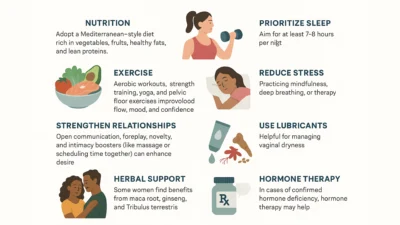
Improving libido naturally is possible through a combination of lifestyle changes and self-care strategies.
Nutrition: Adopt a Mediterranean-style diet rich in vegetables, fruits, healthy fats, and lean proteins.
Exercise: Aerobic workouts, strength training, yoga, and pelvic floor exercises improve blood flow, mood, and confidence.
Prioritize sleep: Aim for at least 7-8 hours per night.
Reduce stress: Practice mindfulness, deep breathing, or therapy.
Strengthen relationships: Open communication, foreplay, novelty, and intimacy boosters (like massage or scheduling time together) can enhance desire.
Use lubricants: Helpful for managing vaginal dryness.
Herbal support: Some women find benefits from maca root, ginseng, saffron, fenugreek, and Tribulus terrestris. Always consult your doctor first.
Hormone therapy: In cases of confirmed hormone deficiency, hormone therapy may help under medical supervision.
When to See a Doctor or Sex Therapist
You should seek professional help if low libido causes distress, affects your relationship, or comes on suddenly without a clear cause.
Other reasons to consult a professional include:
- Pain during sex or physical discomfort
- Persistent mood symptoms
- History of trauma or abuse
- Lack of improvement with lifestyle changes
Doctors or sex therapists can provide physical exams, counseling, or referrals for hormonal treatment when appropriate.
Key Thought: Reclaiming Your Sex Drive
Low libido is more common than most people realize, especially during life transitions like postpartum or menopause.
The good news? It’s usually manageable.
Whether the root cause is hormonal, psychological, or relational, reclaiming your sex drive is possible through open communication, professional support, and healthy habits that nourish both your body and mind.
FAQs
How common is low libido in women?
Around one-third of women experience low libido at some point, with rates climbing to over 50% after menopause.
Which hormones most affect libido in women?
Estrogen, progesterone, and testosterone. Declines in any of these, especially after menopause, can reduce sexual desire.
Can treating low libido improve quality of life?
Yes. Many women report improved relationships, mood, and self-esteem after addressing the underlying cause.
What medications can affect libido?
SSRIs (antidepressants), some antipsychotics, blood pressure medications, and hormonal contraceptives.
Is there a quick fix?
There’s no instant solution. Long-term improvement often requires a combination of medical support, therapy, and lifestyle changes.
When should I see a professional?
If low libido causes emotional distress, impacts your relationship, or isn’t improving with at-home changes, it’s time to seek expert guidance.
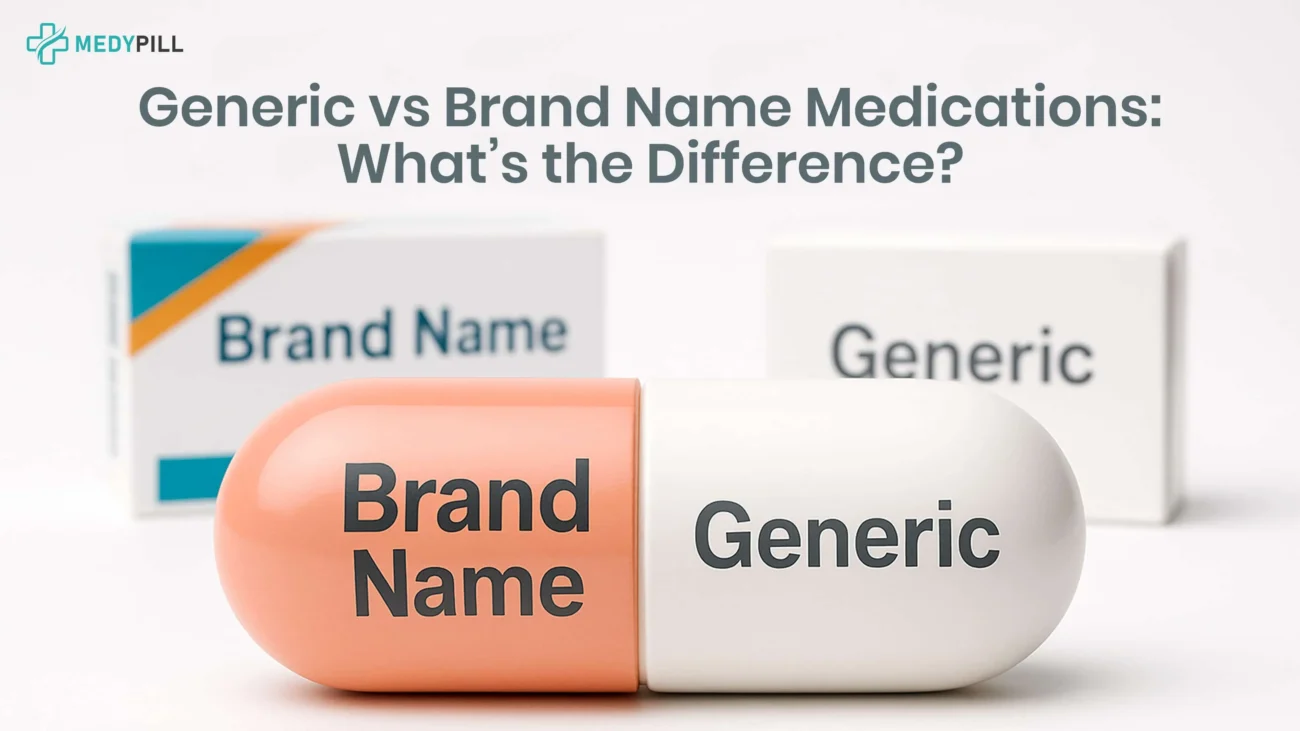
Aug 12, 2025
Generic and brand name medications work the same. They treat the same conditions and use the same main ingredients. The big difference is price generics…
VIEW DETAILSAug 12, 2025
Fenbendazole is not considered safe for human use according to the FDA and major medical bodies. While some people are…
Aug 12, 2025
Semaglutide helps people lose weight by lowering hunger and making them feel full for longer. It’s available as a weekly…

